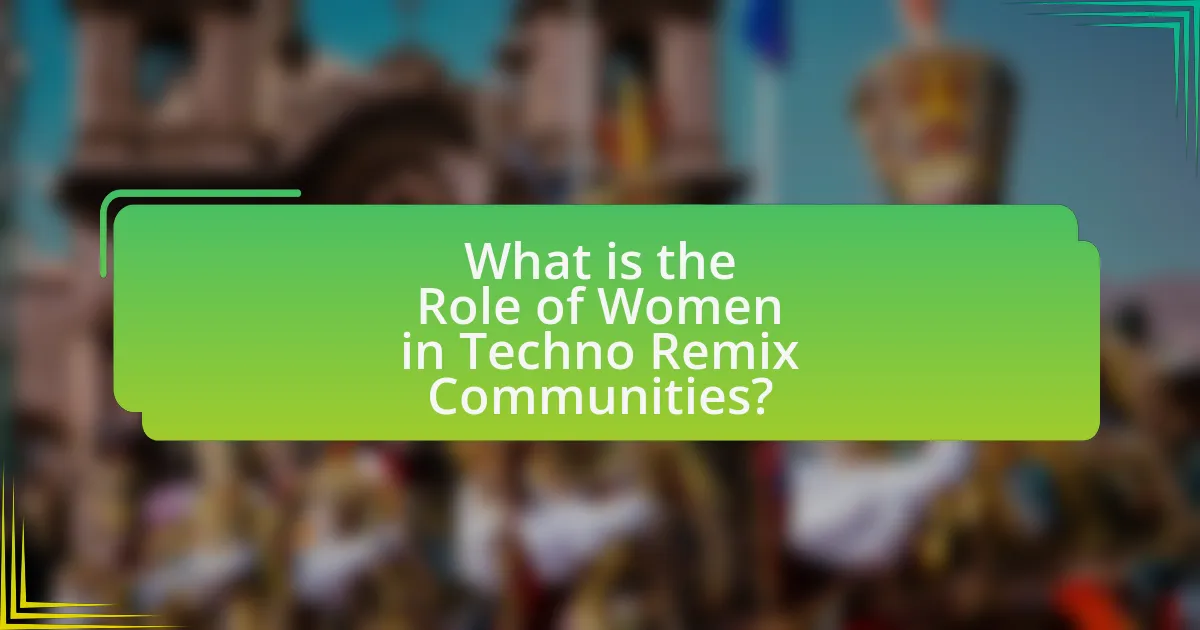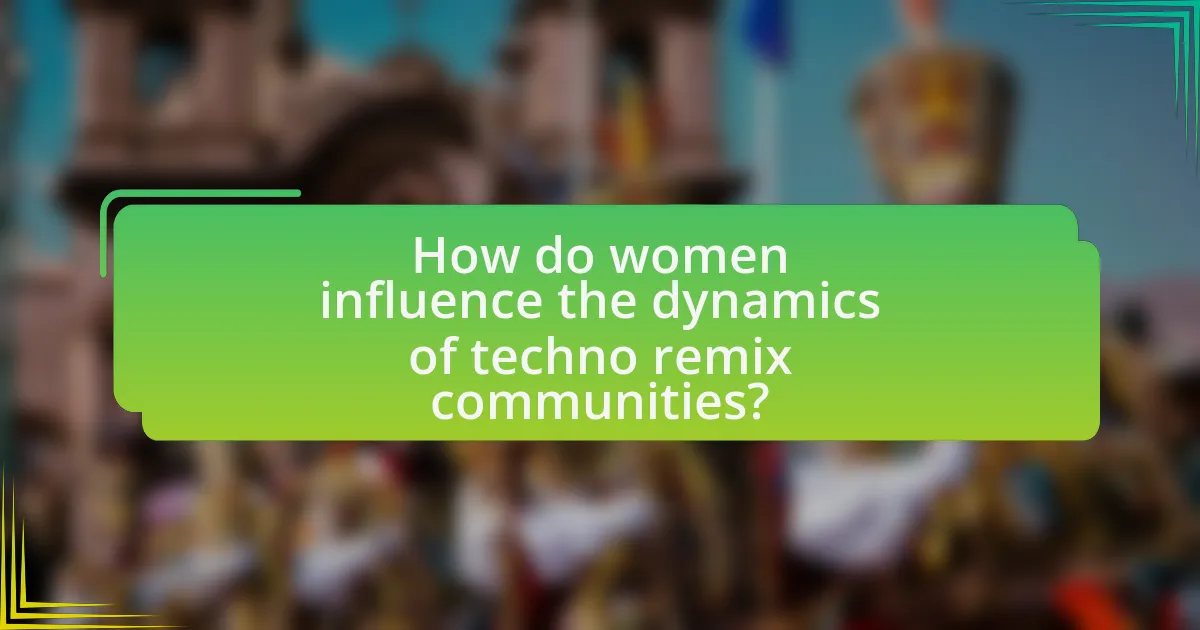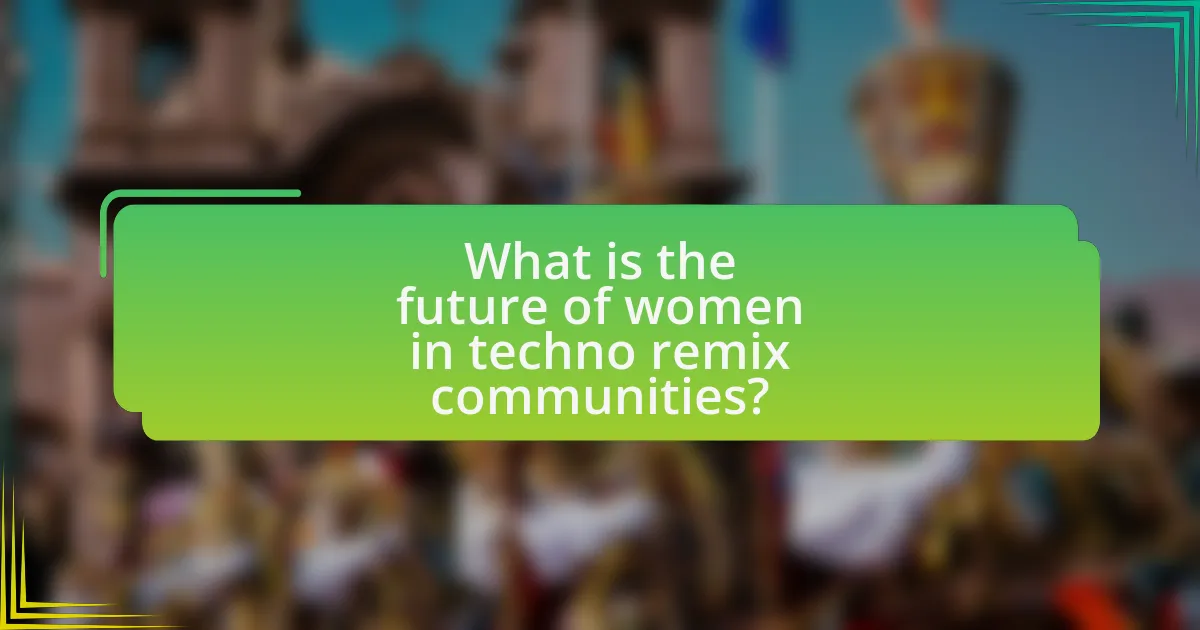The article examines the significant role of women in techno remix communities, highlighting their contributions to music production, event organization, and collaborative projects that enhance diversity within the genre. It discusses historical milestones, the evolution of techno remix culture, and the challenges women face, including gender bias and lack of representation. Additionally, the article outlines initiatives and organizations that support women in the techno scene, the impact of mentorship programs, and the influence of women’s unique perspectives on the sound and style of techno remixes. It concludes by addressing the future of women’s representation in these communities and the practical steps they can take to thrive in the industry.

What is the Role of Women in Techno Remix Communities?
Women play a crucial role in techno remix communities by contributing to the creative processes, shaping the genre’s evolution, and fostering inclusivity. Their involvement includes producing music, organizing events, and participating in collaborative projects, which enhances the diversity of sounds and perspectives within the community. Research indicates that women in these communities often challenge gender norms and promote equality, as seen in initiatives like the female-focused DJ collectives and workshops that aim to empower women in music production. This active participation not only enriches the techno scene but also helps to dismantle barriers that have historically marginalized women in electronic music.
How have women contributed to the evolution of techno remix culture?
Women have significantly contributed to the evolution of techno remix culture through their roles as producers, DJs, and remix artists, shaping the sound and direction of the genre. Pioneers like Delia Derbyshire, who was part of the BBC Radiophonic Workshop, created innovative electronic sounds in the 1960s that influenced techno’s development. Additionally, contemporary artists such as Nina Kraviz and Charlotte de Witte have gained prominence, showcasing their unique styles and pushing the boundaries of techno through remixes that incorporate diverse influences. Research indicates that women’s participation in electronic music has increased, with organizations like Female:Pressure advocating for gender equality in the scene, further solidifying their impact on techno remix culture.
What historical milestones highlight women’s involvement in techno remix communities?
Historical milestones that highlight women’s involvement in techno remix communities include the emergence of female DJs and producers in the 1980s, such as DJ Spooky and Ellen Allien, who gained recognition for their innovative contributions to the genre. In 1992, the first all-female DJ collective, “The Sisterhood,” was formed, promoting female talent in a male-dominated industry. Additionally, the establishment of platforms like “Women in Electronic Music” in the 2000s provided visibility and support for women artists, further solidifying their presence in techno remix culture. These milestones demonstrate the significant impact women have had in shaping and diversifying the techno music scene.
How have women’s contributions shaped the sound and style of techno remixes?
Women’s contributions have significantly shaped the sound and style of techno remixes by introducing diverse musical influences and innovative production techniques. Pioneering female artists like Delia Derbyshire, who was instrumental in the development of electronic music in the 1960s, laid the groundwork for future generations, while contemporary figures such as Nina Kraviz and Charlotte de Witte have pushed the boundaries of techno through their unique styles and approaches. Research indicates that female producers often incorporate elements from various genres, such as house and ambient, enriching the techno soundscape. Furthermore, women’s involvement in remix culture has fostered a more inclusive environment, encouraging collaboration and experimentation, which has led to the emergence of new sub-genres and styles within techno.
What challenges do women face in techno remix communities?
Women in techno remix communities face several challenges, including gender bias, lack of representation, and harassment. Gender bias manifests in the form of stereotypes that question women’s technical skills and creativity, often leading to their work being undervalued compared to their male counterparts. The lack of representation is evident, as women are significantly underrepresented in DJ lineups and production roles, which can discourage participation and limit visibility. Additionally, harassment, both online and at events, creates a hostile environment that can deter women from engaging fully in these communities. Studies indicate that women in electronic music often report experiences of discrimination and exclusion, highlighting the need for more inclusive practices within the industry.
What barriers exist for women in gaining recognition within these communities?
Women face several barriers in gaining recognition within techno remix communities, primarily due to gender bias, lack of representation, and limited access to networks. Gender bias manifests in the form of stereotypes that question women’s technical abilities and contributions, often leading to their work being undervalued or overlooked. The lack of representation in these communities means that women have fewer role models and mentors, which can hinder their visibility and opportunities for collaboration. Additionally, limited access to professional networks restricts women’s ability to showcase their work and connect with influential figures in the industry. Research indicates that these barriers contribute to a significant gender gap in recognition and participation within the techno remix scene.
How do societal perceptions impact women’s participation in techno remix culture?
Societal perceptions significantly impact women’s participation in techno remix culture by perpetuating stereotypes that often marginalize their contributions. Women are frequently viewed as less competent in technical skills, which can discourage their involvement in remixing and producing music. Research indicates that only 17% of music producers are women, reflecting a broader societal bias that associates music production with masculinity. This perception creates barriers, such as a lack of representation and mentorship opportunities, which further limits women’s visibility and participation in the techno remix scene. Consequently, these societal attitudes not only affect individual women’s confidence but also shape the overall dynamics of the techno remix community, leading to an underrepresentation of female artists and producers.
What initiatives support women in techno remix communities?
Initiatives that support women in techno remix communities include organizations like Female:Pressure, which promotes visibility and networking for women in electronic music, and She Said So, which focuses on empowering women in the music industry through mentorship and collaboration. Additionally, events such as the Femme House initiative provide educational workshops and resources specifically designed for women producers and DJs, fostering skill development and community engagement. These initiatives are crucial in addressing gender disparities in the techno scene, as evidenced by studies showing that women are significantly underrepresented in electronic music festivals and lineups.
What organizations are dedicated to empowering women in the techno scene?
Organizations dedicated to empowering women in the techno scene include Female:Pressure, a global network that promotes female artists and advocates for gender equality in electronic music. Another significant organization is She Said So, which focuses on increasing the visibility and representation of women in the music industry, including techno. Additionally, the collective Girls of Techno aims to create a supportive community for women in the techno genre, providing opportunities for collaboration and performance. These organizations actively work to address the gender imbalance in the techno scene and support female artists through various initiatives and events.
How do mentorship programs influence women’s roles in techno remixing?
Mentorship programs significantly enhance women’s roles in techno remixing by providing essential skills, networking opportunities, and confidence-building support. These programs often connect aspiring female producers with experienced mentors who offer guidance on technical skills, creative processes, and industry navigation. For instance, initiatives like the Female:Pressure network have been instrumental in fostering a supportive community, leading to increased visibility and participation of women in the techno scene. Research indicates that women involved in mentorship programs report higher levels of self-efficacy and are more likely to pursue careers in music production, thereby contributing to a more diverse and inclusive environment in techno remixing.

How do women influence the dynamics of techno remix communities?
Women significantly influence the dynamics of techno remix communities by contributing unique perspectives, fostering inclusivity, and driving innovation in sound and style. Their participation often challenges traditional gender norms within the electronic music scene, leading to a more diverse range of remixes and collaborations. Research indicates that female producers and DJs bring distinct emotional and cultural narratives to their work, which can resonate with broader audiences and inspire new trends. For instance, studies have shown that events featuring female artists tend to attract diverse crowds, enhancing community engagement and collaboration. This shift not only enriches the musical landscape but also encourages more women to enter the field, further transforming the dynamics of these communities.
What unique perspectives do women bring to techno remixing?
Women bring diverse and innovative perspectives to techno remixing, often emphasizing emotional depth and narrative storytelling in their work. This approach contrasts with traditional techno’s focus on rhythm and beat, allowing for a richer auditory experience. Research indicates that female producers frequently incorporate elements from various genres, such as pop and ambient music, which broadens the sonic palette of techno remixes. Additionally, women often challenge gender norms within the electronic music scene, fostering inclusivity and collaboration, which can lead to unique soundscapes and creative expressions. This perspective is supported by studies highlighting the impact of female artists in reshaping the electronic music landscape, demonstrating their significant contributions to the genre’s evolution.
How do women’s experiences shape the themes and messages in their remixes?
Women’s experiences significantly shape the themes and messages in their remixes by infusing personal narratives and social commentary into their work. These experiences often reflect issues such as gender inequality, empowerment, and resilience, which resonate within the broader context of techno culture. For instance, female producers frequently draw from their encounters with sexism in the music industry, using their remixes to challenge stereotypes and advocate for inclusivity. Research indicates that women in music often incorporate elements of their lived experiences, leading to a unique blend of emotional depth and political awareness in their remixes, thereby influencing the overall narrative of the techno genre.
What role do women play in fostering inclusivity within techno communities?
Women play a crucial role in fostering inclusivity within techno communities by actively participating in events, creating safe spaces, and promoting diverse representation. Their involvement helps to challenge gender stereotypes and encourages a more welcoming environment for all individuals, regardless of background. Research indicates that events featuring female artists and organizers tend to attract a more diverse audience, thereby enhancing community engagement and participation. For instance, initiatives like female DJ collectives and workshops have been shown to increase the visibility of women in the scene, leading to a more balanced representation and a culture that values inclusivity.
How do collaborations among women enhance techno remix culture?
Collaborations among women enhance techno remix culture by fostering diversity and innovation within the genre. When women work together, they bring unique perspectives and experiences that challenge traditional norms in techno music, leading to fresh sounds and creative approaches. Research indicates that female collaborations often result in a more inclusive environment, which encourages experimentation and the blending of different musical styles. For instance, the collective efforts of female artists have been shown to increase visibility and representation in a predominantly male-dominated industry, as seen in initiatives like the female-led label Femme Culture, which promotes women in electronic music. This collaborative spirit not only enriches the techno remix culture but also empowers women artists, creating a supportive network that drives the genre forward.
What are some notable collaborations between female artists in the techno scene?
Notable collaborations between female artists in the techno scene include the partnership between Charlotte de Witte and Enrico Sangiuliano, which resulted in the track “Selected.” Additionally, the collaboration between Nina Kraviz and Helena Hauff on the track “The Future” showcases the synergy of their distinct styles. Another significant collaboration is between Amelie Lens and Shlømo, which produced the track “Form.” These collaborations highlight the increasing visibility and influence of female artists in the techno genre, contributing to its evolution and diversity.
How do these collaborations challenge traditional norms in music production?
Collaborations in techno remix communities challenge traditional norms in music production by promoting inclusivity and diversity, which disrupts the male-dominated landscape. These partnerships often bring together artists from various backgrounds, allowing for a fusion of different styles and perspectives that traditional production methods typically overlook. For instance, women in these collaborations often leverage technology and digital platforms to create and share music, thereby redefining the roles of producers and performers. This shift is evidenced by the increasing visibility of female artists in techno, who have historically been marginalized, as seen in events like the Berlin Atonal festival, which showcases a diverse lineup that includes women and non-binary artists. Such collaborations not only challenge gender stereotypes but also encourage innovative approaches to music creation, ultimately reshaping the industry’s standards.

What is the future of women in techno remix communities?
The future of women in techno remix communities is poised for growth and increased visibility. As the music industry evolves, there is a rising recognition of the contributions women make to techno and remix culture, evidenced by initiatives aimed at promoting gender diversity. For instance, organizations like Female:Pressure advocate for women’s representation in electronic music, highlighting the need for equitable opportunities. Additionally, statistics show that female DJs and producers are gaining more platforms, with events increasingly featuring diverse lineups. This shift indicates a positive trajectory for women’s roles in these communities, fostering an environment where their creativity and influence can flourish.
How is the representation of women changing in techno remix culture?
The representation of women in techno remix culture is increasingly becoming more prominent and diverse. Historically, women have been underrepresented in electronic music, but recent trends show a rise in female DJs, producers, and remix artists, contributing to a more inclusive environment. For instance, events like the “Women in Music” initiative and platforms such as “Female:Pressure” highlight and support female talent in the techno scene, showcasing their work and providing networking opportunities. Additionally, studies indicate that female artists are gaining visibility through social media and streaming platforms, which facilitate their reach and engagement with audiences. This shift not only empowers women but also enriches the techno remix culture with varied perspectives and creativity.
What trends indicate a shift towards greater inclusion of women in techno?
Trends indicating a shift towards greater inclusion of women in techno include an increase in female artists and DJs gaining recognition, as well as the emergence of female-led collectives and events. For instance, the number of women performing at major techno festivals has risen significantly, with events like the Berlin Atonal and Movement Festival showcasing more female talent than in previous years. Additionally, initiatives such as the “Female:Pressure” network, which promotes female artists in electronic music, have gained traction, highlighting the growing visibility and support for women in the genre. This shift is further evidenced by studies showing that female participation in electronic music production and DJing has increased, reflecting a broader cultural movement towards gender equality in the music industry.
How can emerging technologies impact women’s roles in techno remixing?
Emerging technologies can significantly enhance women’s roles in techno remixing by providing accessible tools and platforms for music creation and distribution. For instance, software like Ableton Live and online platforms such as SoundCloud enable women to produce, share, and collaborate on remixes without the need for traditional studio access. This democratization of music production allows women to showcase their creativity and gain visibility in a historically male-dominated field. Additionally, social media and streaming services facilitate networking and community building, empowering women to connect with other artists and audiences globally. Research indicates that increased access to technology correlates with higher participation rates among women in music production, as seen in studies by the Berklee College of Music, which highlight the growing presence of female producers in electronic music.
What practical steps can women take to thrive in techno remix communities?
Women can thrive in techno remix communities by actively participating in events, collaborating with other artists, and leveraging social media for networking. Engaging in local and online events allows women to showcase their skills and connect with like-minded individuals, fostering a sense of community. Collaborating with other artists enhances creativity and expands reach, as partnerships can lead to new opportunities and exposure. Utilizing social media platforms, such as Instagram and SoundCloud, enables women to share their work, gain followers, and connect with industry professionals, which is crucial in a digital age where visibility can significantly impact success. These steps are supported by the increasing representation of women in electronic music, as seen in initiatives like SheSaidSo and the rise of female DJs and producers in mainstream festivals.
What skills are essential for women looking to enter the techno remix scene?
Essential skills for women entering the techno remix scene include proficiency in music production software, an understanding of sound design, and knowledge of music theory. Proficiency in software like Ableton Live or FL Studio allows for effective creation and manipulation of tracks, while sound design skills enable the crafting of unique sounds that stand out in the genre. Additionally, a solid grasp of music theory aids in structuring remixes and creating harmonious compositions. These skills are critical as they empower women to contribute creatively and technically to the techno remix community, which has historically been male-dominated.
How can women leverage social media to build their presence in techno communities?
Women can leverage social media to build their presence in techno communities by actively engaging with content, sharing their own music, and networking with other artists and fans. By consistently posting mixes, participating in discussions, and collaborating with other creators, women can establish their identity and visibility within these communities. Research indicates that social media platforms like Instagram and SoundCloud are effective for musicians to showcase their work and connect with audiences, as they allow for direct interaction and feedback. Additionally, women can utilize hashtags and join relevant groups to increase their reach and foster connections, thereby enhancing their presence in the techno scene.


